Archive for April, 2018
-
AN ISLAND FLOATING ON A STRANGE SEA
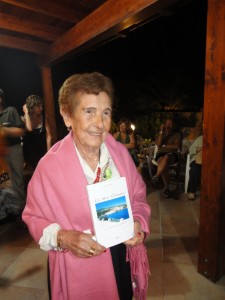 Franca Fadda Silvetti led a most unusual life. For 33 years, she lived with her family on the island of Asinara in Sardinia, Italy. At the time, the island served as a prison. Silvetti’s husband was the prison’s doctor while she was the only teacher for the island’s elementary school where all the young children attended. Trusted prisoners were allowed to roam freely around the island to work outside the prison; one of them was her housekeeper and he also took care of her children. After changing into a high security prison, the island was eventually abandoned and turned into a national park. An intriguing visit to this island led me to a book which Silvetti wrote about her memories on Asinara. Her book eventually led me to her.
Franca Fadda Silvetti led a most unusual life. For 33 years, she lived with her family on the island of Asinara in Sardinia, Italy. At the time, the island served as a prison. Silvetti’s husband was the prison’s doctor while she was the only teacher for the island’s elementary school where all the young children attended. Trusted prisoners were allowed to roam freely around the island to work outside the prison; one of them was her housekeeper and he also took care of her children. After changing into a high security prison, the island was eventually abandoned and turned into a national park. An intriguing visit to this island led me to a book which Silvetti wrote about her memories on Asinara. Her book eventually led me to her.In her book La Mia Asinara, Silvetti describes in detail her arrival on the island.
“I arrived in Asinara on 4th October 1952 with my two sons; Aldo who was 3 years old and Gian Piero who was 2. I was very young and very much in love with my husband Vindice. He had arrived some days before on the island to start his new job as a prison doctor. On his arrival, he fell in love with the island and he sent me a message which read ‘Come here, you will not regret it!’”
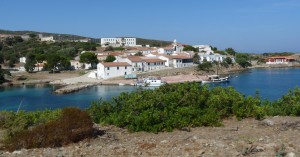 From the first moments, even before she actually stepped on Asinara, Silvetti had to learn to deal with the circumstances of a peculiar life.
From the first moments, even before she actually stepped on Asinara, Silvetti had to learn to deal with the circumstances of a peculiar life.“We went up with our luggage on the boat named Redenzione. Before we left for the island, I looked around at the other passengers. Some policemen were accompanying a group of men of different ages who wore similar clothes. The men were handcuffed and restricted by chains.”
Soon, Silvetti started her new life in a two-floor comfortable house in Cava D’Oliva. All the houses were painted white and they were constructed along a semi-circular area which looked out at the bay. Although initially concerned that prisoners were regularly in contact with the island’s inhabitants, she managed to take this new reality in her stride once her husband assured her that they were safe.
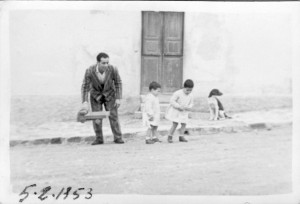 “Luigi was a young handsome Sicilian who was sentenced to 9 years imprisonment after he was found to form part of a group who worked for a renowned thief. He was recommended to us by the prison authorities to help us with the house and with our sons. During our absence, while we were at work, he took care of all the chores and he was also responsible to look after our children and to play with them. Upon our return home, we would find everything in order and the table ready for dinner. There were times when he even prepared our food since he was an excellent cook.”
“Luigi was a young handsome Sicilian who was sentenced to 9 years imprisonment after he was found to form part of a group who worked for a renowned thief. He was recommended to us by the prison authorities to help us with the house and with our sons. During our absence, while we were at work, he took care of all the chores and he was also responsible to look after our children and to play with them. Upon our return home, we would find everything in order and the table ready for dinner. There were times when he even prepared our food since he was an excellent cook.”She started to teach on the 15th October. It did not take her long to realize that teaching in Asinara was quite tiring and challenging but also very satisfying.
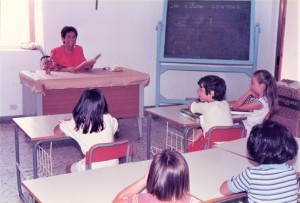 “I had a small classroom which was frequented by 19 children of various ages. Since they had not attended to a kindergarden, most of the children were totally unprepared for schooling. They had no idea about rules and how to behave in groups. To make matters worse, my predecessors had all been males who had found it very difficult to adapt to the solitude of the island and they would often leave the school closed for a whole fortnight.”
“I had a small classroom which was frequented by 19 children of various ages. Since they had not attended to a kindergarden, most of the children were totally unprepared for schooling. They had no idea about rules and how to behave in groups. To make matters worse, my predecessors had all been males who had found it very difficult to adapt to the solitude of the island and they would often leave the school closed for a whole fortnight.”Some of the children lived in the far extremities of the island and they had to ride a carriage which was driven by a trusted prisoner.
“In this particular atmosphere of the island, I was also expected to cope with a form of classism which did not accept that a child of a common policeman would do better in school than the child of a higher person in authority. Often I had to use sheer diplomacy and the use of white lies to help all the children feel good with themselves.”
Prisoners formed part of the daily routine of Asinara’s inhabitants.
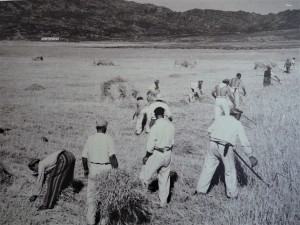 “The school’s caretaker was a prisoner. Each month, the students collected a small sum of money for him which was credited in his account. It was prohibited to give any money directly to a prisoner. Daily needs were catered for by another prisoner who went to each house to take a list of the products which were required such as pasta, sugar and bread. These products would then be brought to each house by an official. In the afternoon, every house would leave a milk container on the window sill. A prisoner would collect these containers so that these will be returned to each house full of milk. Other prisoners worked in the fields with the farmers or helped to make meat products with the butchers. The prisoners were always kept under surveillance. Officials would visit places and houses where these prisoners worked at various times of the day, even when the owners were not present, to confirm that everything was in order.”
“The school’s caretaker was a prisoner. Each month, the students collected a small sum of money for him which was credited in his account. It was prohibited to give any money directly to a prisoner. Daily needs were catered for by another prisoner who went to each house to take a list of the products which were required such as pasta, sugar and bread. These products would then be brought to each house by an official. In the afternoon, every house would leave a milk container on the window sill. A prisoner would collect these containers so that these will be returned to each house full of milk. Other prisoners worked in the fields with the farmers or helped to make meat products with the butchers. The prisoners were always kept under surveillance. Officials would visit places and houses where these prisoners worked at various times of the day, even when the owners were not present, to confirm that everything was in order.”Although it did not rain much on Asinara, its products were bountiful. The inhabitants were almost totally dependent on the island’s products. Meat was provided by the animals which were bred for this reason. Fish were abundant in the transparent water of the surrounding sea. For several years, there was no electricity on the island and people had to use candles and lamps for the night.
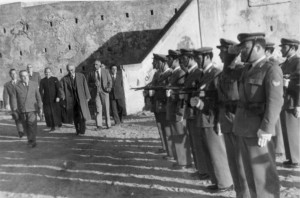 “Like everywhere else, there were good and bad moments but I can say that generally, we lived a pleasant life on Asinara. Matters changed in the 1970s when the prisons were restructured to become high-security penitentiaries to detain some of the most dangerous criminals, such as those that formed part of the Brigate Rosse, terrorists, and mafia members. This development led to the end of an era. My husband and I went on pension in 1985 and we had to leave Asinara.”
“Like everywhere else, there were good and bad moments but I can say that generally, we lived a pleasant life on Asinara. Matters changed in the 1970s when the prisons were restructured to become high-security penitentiaries to detain some of the most dangerous criminals, such as those that formed part of the Brigate Rosse, terrorists, and mafia members. This development led to the end of an era. My husband and I went on pension in 1985 and we had to leave Asinara.”My visit to Asinara was quite stirring and profoundly emotional. After reading Silvetti’s book, I felt an urge to seek her out and contact her. I was thrilled when she reached back to me and responded to my questions.
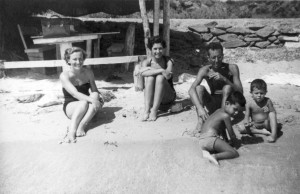
 “After living intensely for 33 years on the island, I felt as if Asinara was my own property. I wrote this book because I wanted to leave a valuable memory to my two sons and daughter Silvia and to their own children so that they would know how we lived on that island. It was a need of mine, especially after my dear husband passed away.”
“After living intensely for 33 years on the island, I felt as if Asinara was my own property. I wrote this book because I wanted to leave a valuable memory to my two sons and daughter Silvia and to their own children so that they would know how we lived on that island. It was a need of mine, especially after my dear husband passed away.”On asking how did it feel to live on a prison island, she responded, “I have never felt in danger. I felt much pity for the prisoners who were deprived of their freedom, were under constant guard, and far from their loved ones especially during feasts.”
I was curious to know whether her children were influenced by such a life?
“Each day we saw the prisoners going on their work like everyone else. It was a normal fact of life. We never saw them imprisoned but always living amongst us. They left no negative impressions on my children’s childhood.”
Did she ever feel like a prisoner herself on such a lonely island?
“No, I never felt like a prisoner. I had my own family and my own job. There were moments when we suffered some inconveniences because of bad weather which did not allow us to reach the mainland but I never felt imprisoned.”
She was 92 years old when I contacted her. She had never returned to the island.
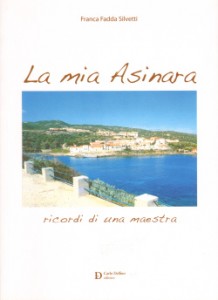 “I did not have the courage to return. Maybe, egoistically speaking, and due to the lovely memories I had on the island, it would have been better to leave Asinara inhabited by a strange population than to abandon it to its present state, to become a tourist attraction. For me Asinara is my whole life and now that I’m old, its memories help me to live a serene life.”
“I did not have the courage to return. Maybe, egoistically speaking, and due to the lovely memories I had on the island, it would have been better to leave Asinara inhabited by a strange population than to abandon it to its present state, to become a tourist attraction. For me Asinara is my whole life and now that I’m old, its memories help me to live a serene life.”Franca Fadda Silvetti passed away at the age of 94 but her memory is still much alive in her inspiring book.
(This article was published in the SENIOR TIMES – APRIL 2018 issued with The Times of Malta newspaper)
-
CORNER COMFORTS
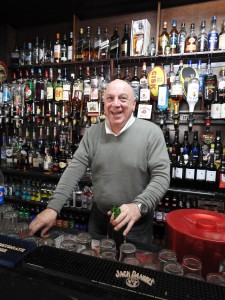 “You wouldn’t survive in this business if you are not brought up in it since childhood. It is just too demanding and it takes up your life completely,” insisted Frankie Cutajar, the owner of Lady Di Pub in Tignè Street, Sliema.
“You wouldn’t survive in this business if you are not brought up in it since childhood. It is just too demanding and it takes up your life completely,” insisted Frankie Cutajar, the owner of Lady Di Pub in Tignè Street, Sliema.“On the other hand, if the seed of entertainment has been nurtured in your blood from an early age, it is difficult to let go of such an engaging and colourful world,” he said as he laughed heartily and poured a tin of golden beer into a large glass for a client.
Cutajar hails from Valletta. Two of his family members are the renowned late musician Oscar Lucas and popular singer Joe Cutajar.
“Back in the old days, their cheerful attitude and exquisite talent used to light up the thrilling atmosphere of Strait Street. I can still remember the time when 10,000 foreign soldiers sought that area in Valletta each week and all those who had a business there, concocted new ways to attract them to their locale.”
“My uncle Oscar Lucas played in various venues. Together with Jimmy Grech (also known as Jimmy l-Irish), he owned the Las Vegas which was the first nightclub to open in Malta and boasted a capacity of 500 seats. It was huge, running from the area where today one finds the Marks and Spencer store and going up to the Embassy. At the age of 12, I worked as a commis waiter in this nightclub, serving customers which were mainly young couples, between 6:00pm and 8:00pm.”
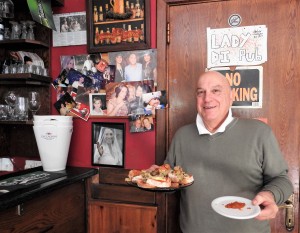 Cutajar got married when he was 18 and kept working at Las Vegas until it closed its doors.
Cutajar got married when he was 18 and kept working at Las Vegas until it closed its doors.“The British Forces’ departure from our islands drained all the energy from Strait Street, turning it into a shadow of what it was. Paceville became the new attraction for the younger generation while Valletta died out during the evenings. Eventually, Jimmy l-Irish, my older brother Harry and I acquired a bar in Melita Street and called it Pippo’s.”
“Later on, my brother and I also took over a business in Tignè Street, Sliema. This place was originally a bar known as Neriku and it was run by my grandfather and grandmother. After it served as an antique shop for some years, we decided to open it as a pub. Many of the visitors who came to Malta and stayed at the surrounding hotels in Sliema were British. So we had no doubts whatsoever about what we were going to name our new pub.”
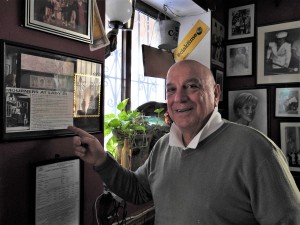 A framed copy of a newspaper feature which hangs on one of the walls narrates how the name Lady Di Pub came to life. Cutajar recounted this incident proudly.
A framed copy of a newspaper feature which hangs on one of the walls narrates how the name Lady Di Pub came to life. Cutajar recounted this incident proudly.“I was having a meal with a well-connected friend of mine at a London restaurant when he introduced me to Lady Diana. I told her that I would be naming a bar after her to record the memorable event of her marriage to Prince Charles. Shortly afterwards, I saw her again at a film premiere in Leicester Square and she reminded me about it.”
Lady Di Pub opened its doors right on Wednesday, 29 July 1981; the day of the eventful fairytale wedding.
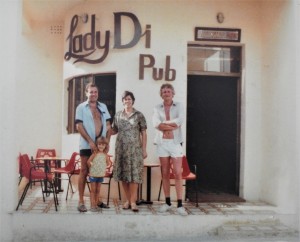 “This is how the pub looked at the time,” Cutajar said as he pointed at another old photo. “It consisted of just two small rooms. However, it had a very good clientele.”
“This is how the pub looked at the time,” Cutajar said as he pointed at another old photo. “It consisted of just two small rooms. However, it had a very good clientele.”Meanwhile, Pippo’s bar in Valletta was turned into Da Pippo’s restaurant and his brother Harry stayed to manage it. Frankie opted to run the pub in Sliema. In 2006, the Lady Di Pub was rebuilt after the property was earmarked for development and was demolished.
“Although the pub was new, I decided to recreate its old British soul. I knew that my clients would appreciate the warm feeling of a unique traditional corner huddled amongst the tall and modern buildings.”
In recent years, Sliema’s architectural context has changed considerably. Huge, inanimate buildings are replacing traditional stately homes, a small number of which still survive in Tignè Street.
“Times change and people have to move on with the progress which is generated. Sliema is not Valletta. Whereas Valletta is a historical city of culture, Sliema is a business hub and a touristic area. The more modernized it is, the more people it attracts, and the more customers will come to this pub,” Cutajar stated as he winked playfully.
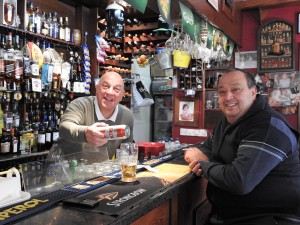 “His charismatic character and that of his son Keith who also works here are the secret of the success of this place,” revealed Ġanni Fenech, a regular client who was having a beer at the bar. “They have a way of making everyone feel welcome and they are also very good in the kitchen. The appetizers in this bar are always bountiful and delicious, urging you to keep on drinking so that the food continues to come out. Seasoned bread, pasta, ricotta and pea pies, cheesecakes… They simply taste like heaven with a glass of beer.”
“His charismatic character and that of his son Keith who also works here are the secret of the success of this place,” revealed Ġanni Fenech, a regular client who was having a beer at the bar. “They have a way of making everyone feel welcome and they are also very good in the kitchen. The appetizers in this bar are always bountiful and delicious, urging you to keep on drinking so that the food continues to come out. Seasoned bread, pasta, ricotta and pea pies, cheesecakes… They simply taste like heaven with a glass of beer.”Right on the point, Frankie came out of the kitchen with a plate of thickly sliced crusty Maltese bread spread with kunserva, a sweet tomato paste, and topped with olives, onions, lettuce and broad beans.
“Especially on Fridays and during weekends, Lady Di Pub is full of people and it stays open until the early morning hours. Some of our clients work in the nearby offices and come here to end the week in a good mood and meet friends. A number of others are regulars from Sliema including a small group of elderly people who have been gathering here each Sunday for the past 30 years! Other locals come from various areas around Malta. However, the majority of our clients are foreigners.”
Frankie starts his day at around 8:30am by doing errands, including buying fresh bread. After enjoying a coffee at a nearby coffee shop, he opens his pub at 10:00am. Soon, the first clients will come in and he starts preparing some inviting appetizers. By now, his long experience and a good knowledge of his clientele have furnished him with an invaluable insight of who will be calling at his pub on each day and what he will need to prepare.
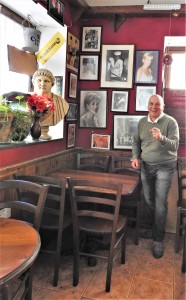 “We are here to make our clients feel comfortable. Should they wish to have lunch or dinner, we can cook anything to their liking, once they advise us beforehand. Last week, we cooked a selection of pasta, fried rabbit and rib-eye steak for a group, and they surely loved it!”
“We are here to make our clients feel comfortable. Should they wish to have lunch or dinner, we can cook anything to their liking, once they advise us beforehand. Last week, we cooked a selection of pasta, fried rabbit and rib-eye steak for a group, and they surely loved it!”Whilst the younger generation prefer to seek out Keith’s company, the older clientele feels closer to Frankie.
“I am 67 now but still going strong,” Frankie joked as he turned to a laptop and turned on some music. “Back in Valletta, we enjoyed live music at our nightclub. Until some years ago, I had a juke box here. Now I have to rely on this new technology. Flexibility is a must in such a business. Nowadays clients demand to hear particular songs while having a drink and this is the most practical way.”
Culture change is also evident in the choice of requested alcohol and in the clientele’s attitude.
“In the past, people preferred whisky especially Jack Daniels. We also served gin and vodka. Today, very few will ask for gin or vodka and the whisky which we sell is mainly J & B, Jameson, and Johnny Walker Black. Earlier generations used to come in and offer drinks to friends and to other people in the pub. We also had incidents when people got heavily drunk and still insisted to have more drinks. The present generation will generally order and pay for their own drinks, whether male or female. They are also more aware of the risks of over-drinking and they rarely get drunk.”
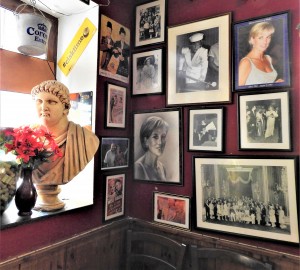 Several framed photos of Lady Diana keep a watchful eye over the pub’s customers.
Several framed photos of Lady Diana keep a watchful eye over the pub’s customers.“These were given to us by her photographer who became our friend,” Frankie explained. “Customers love to look at them especially now that she’s gone. She was very cherished by the people and they still miss her terribly.”
After her tragic death on 31 August 1997, Lady Diana’s fans were distraught. They frantically searched for anything which connected them to her.
“For a number of days after her demise, people left flowers at our doors as a sign of mourning. A British journalist for The People came to visit the pub and interviewed me about this experience. It was certainly a very disturbing loss but in this little corner in Malta, Lady Di’s memory is still very much alive.”
(This feature was published in SLIEMA TIMES – APRIL 2018 issued with The Times of Malta)
-
Ancient practices to relieve modern issues
The Mediterranean Regional Centre for Traditional Chinese Medicine in Kordin, Paola offers a variety of services which aim to improve health and wellbeing. Based on Chinese medical practices which date to more than 2000 years of knowledge, the Centre is run by a team of Chinese doctors who promote an alternative medicine which is well beyond what conventional medicine is about. Besides providing medical treatments, the Centre acts also as a source of information for those who would like to learn more about these ancient practices.
On Sunday, 25 March 2018, a series of three lectures which were organized at the Centre introduced the participants to the themes of neck problem therapies, moxibustion treatments, and the perimenopausal syndrome.
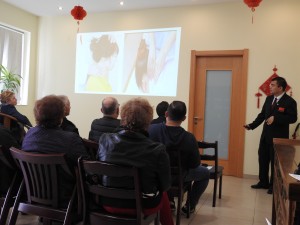 Dr Lu discussed the widespread problem of neck pain and showed some exercises which one can use to avert or to alleviate neck pain.
Dr Lu discussed the widespread problem of neck pain and showed some exercises which one can use to avert or to alleviate neck pain.“Neck pain does not only affect the neck area but it can also lead to several discomforts along other parts of the body. Nowadays many people tend to spend long hours in incorrect postures while looking down at mobiles, sitting at office desks while working on a computer, and watching tv in bed or on a sofa. These are some of the common traits which lead to muscle stress and pain. It only takes little to avoid these mistakes: mobiles should be read at eye level, office chairs should allow workers to sit straight and look comfortably at the computer, tv should not be watched while lying down, and an appropriate pillow should support the spine at the right curve to allow the neck to relax. Ideally, one should change posture regularly to relieve or avoid muscle soreness.”
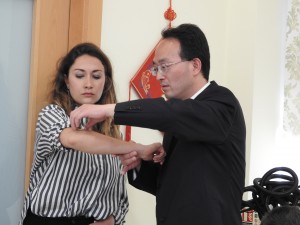 Dr. Zhang explained the benefits of moxibustion treatments and demonstrated how these are applied to patients.
Dr. Zhang explained the benefits of moxibustion treatments and demonstrated how these are applied to patients.“Moxibustion is a traditional Chinese medicine therapy which consists of burning dried mugwort leaf, also known as moxa, to bring relief from pain to the patient. This leaf has a pleasant fragrance and is easy to ignite. Moxibustion is safe and easy to operate. It is also non toxic and has no adverse reactions. However, it should only be done at a professional clinic since there is a risk of getting burnt if not handled properly. Doctors apply moxa to warm meridian points along the body in order to stimulate blood circulation.”
Dr Ma talked about women’s health care and focused on the perimenopausal syndrome which affects a wide section of the female population from the age of 45 to 55. She indicated some exercises which help to relieve stress and also improve memory.
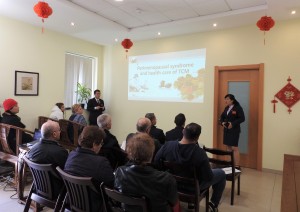 “Perimenopause refers to the time when the body makes the transition to menopause, thereby marking the end of the reproductive years. At this point, women may undergo various symptoms which can make their life stressful and difficult. Sudden hot flashes, insomnia, vaginal dryness and discomfort during love-making, headaches, forgetfulness and emotional instability are some of the main occurrences. Although this change is a natural process, ideally the outcome of menopause should not take place abruptly since this might seriously disturb a woman’s life and also the lives of all those around her. By living a healthy life, eating properly, doing exercise and keeping positive, a woman may help herself to allow a smoother transition which will lead to lesser repercussions. After all, life is what you make it.”
“Perimenopause refers to the time when the body makes the transition to menopause, thereby marking the end of the reproductive years. At this point, women may undergo various symptoms which can make their life stressful and difficult. Sudden hot flashes, insomnia, vaginal dryness and discomfort during love-making, headaches, forgetfulness and emotional instability are some of the main occurrences. Although this change is a natural process, ideally the outcome of menopause should not take place abruptly since this might seriously disturb a woman’s life and also the lives of all those around her. By living a healthy life, eating properly, doing exercise and keeping positive, a woman may help herself to allow a smoother transition which will lead to lesser repercussions. After all, life is what you make it.”More information about the Mediterranean Regional Centre for Traditional Chinese Medicine and its services is available on Facebook or by calling on 2169 1799.
(This feature was published in The Times of Malta on 1st April 2018)
Travelogue
Archives
Recent Posts
- A MATTER OF FATE
- MALTA’S PREHISTORIC TREASURES
- THE MAGIC IS IN THE DETAIL
- THE SELLING GAME
- NEVER FORGOTTEN
- Ġrajjiet mhux mitmuma – 35 sena mit-Traġedja tal-Patrol Boat C23
- AN UNEXPECTED VISIT
- THE SISTERS OF THE CRIB
Comments
- Pauline Harkins on Novella – Li kieku stajt!
- admin on IL-KARNIVAL TRAĠIKU TAL-1823
- Albert on IL-KARNIVAL TRAĠIKU TAL-1823
- Martin Ratcliffe on Love in the time of war
- admin on 24 SENA ILU: IT-TRAĠEDJA TAL-PATROL BOAT C23